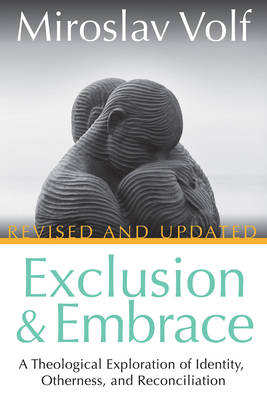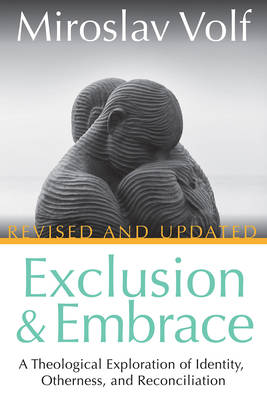
- Afhalen na 1 uur in een winkel met voorraad
- Gratis thuislevering in België vanaf € 30
- Ruim aanbod met 7 miljoen producten
- Afhalen na 1 uur in een winkel met voorraad
- Gratis thuislevering in België vanaf € 30
- Ruim aanbod met 7 miljoen producten
Zoeken
Exclusion and Embrace, Revised and Updated
A Theological Exploration of Identity, Otherness, and Reconciliation
Miroslav Volf
Paperback | Engels
€ 45,95
+ 91 punten
Uitvoering
Omschrijving
Life in the twenty-first century presents a disturbing reality. Otherness, the simple fact of being different in some way, has come to be defined as in and of itself evil. Miroslav Volf contends that if the healing word of the gospel is to be heard today, Christian theology must find ways of speaking that address the hatred of the other. Is there any hope of embracing our enemies? Of opening the door to reconciliation? Reaching back to the New Testament metaphor of salvation as reconciliation, Volf proposes the idea of embrace as a theological response to the problem of exclusion. Increasingly we see that exclusion has become the primary sin, skewing our perceptions of reality and causing us to react out of fear and anger to all those who are not within our (ever-narrowing) circle. In light of this, Christians must learn that salvation comes, not only as we are reconciled to God, and not only as we "learn to live with one another," but as we take the dangerous and costly step of opening ourselves to the other, of enfolding him or her in the same embrace with which we have been enfolded by God. Volf won the 2002 Louisville Grawemeyer Award in Religion for the first edition of his book, Exclusion & Embrace: A Theological Exploration of Identity, Otherness, and Reconciliation (Abingdon, 1996). In that first edition, professor Volf, a Croatian by birth, analyzed the civil war and "ethnic cleansing" in the former Yugoslavia, and he readily found other examples of cultural, ethnic, and racial conflict to illustrate his points. Since September 11, 2001, and the subsequent epidemic of terror and massive refugee suffering throughout the world, Volf revised Exclusion and Embrace to account for the evolving dynamics of inter-ethnic and international strife.
Specificaties
Betrokkenen
- Auteur(s):
- Uitgeverij:
Inhoud
- Aantal bladzijden:
- 336
- Taal:
- Engels
Eigenschappen
- Productcode (EAN):
- 9781501861079
- Verschijningsdatum:
- 20/08/2019
- Uitvoering:
- Paperback
- Formaat:
- Trade paperback (VS)
- Afmetingen:
- 152 mm x 226 mm
- Gewicht:
- 498 g

Alleen bij Standaard Boekhandel
+ 91 punten op je klantenkaart van Standaard Boekhandel
Beoordelingen
We publiceren alleen reviews die voldoen aan de voorwaarden voor reviews. Bekijk onze voorwaarden voor reviews.











